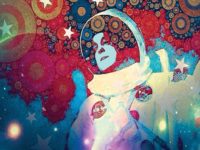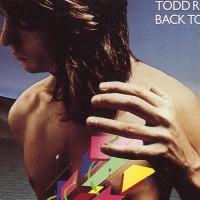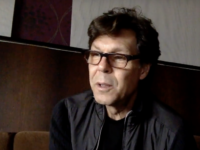For some people, when they hit a certain age it’s all over. That age was 50 for Todd Rundgren.
No, he hasn’t stopped working. He released his most recent recording, White Knight, in 2017. He still tours regularly, including a multi-state tour that was just scrubbed due to the COVID-19 pandemic.
But when Rundgren wrote his personal memoir The Individualist: Digressions, Dreams & Dissertations two years ago, he ended it in 1998 – when he hit 50. That was the theme of his tour, dubbed “The Individualist, a True Star.” Or at least it was going to be, before he canceled or postponed tour dates set to start May 1.
The game plan was to play only material he recorded prior to 1998, with a twist. Not his 1997 recording of the same name, where Rundgren re-recorded his hits bossa nova style, but featuring music from his fourth album, A Wizard, a True Star and other tracks recorded prior to his hitting the half-century mark. At some of the venues on this tour, Rundgren was scheduled to perform two nights in a row, enabling him to play one side of Wizard each night. Then he’d fill in the rest of the shows with tracks from across his career – prior to that magical year of 1998, of course.
For the tour dates which were one night only, he’d play one side of the album. In keeping with his zeal for technology, the plan was to debut an app which would allow fans to vote on which side of the album they wanted to hear.
Just another day in the life of one of music’s most engaged and forward-thinking mavericks. For the septuagenarian rocker – he turns 72 on June 22, 2020 – it’s always something new. “I’m still staying busy. There’s a lot to do,” Todd Rundgren told me in an interview from his home in Hawaii. “I have a lot of different ways to present myself.”
That’s for sure. He’s played with orchestras, synth-heavy bands, dancers, a backing group comprised only of vocalists, a string quartet, even with a group of mimes (hello, Hello People). He toured two years with a reconstituted Utopia, keyboardist Gil Assayas rounding out the quartet with old mates Willie Wilcox and Kasim Sulton. He’s previously toured performing the entirety of A Wizard, a True Star, as well as another tour where he played all of his albums Todd (released in 1973) and Healing from 1981.
Rundgren said his path in life came down to a choice between two different directions: “There were only two things [that interested him] after high school: Play guitar in a band or learn to program computers.” That Todd Rundgren chose the former led not only to his career in songwriting and performing, but also to producing other artists (Meat Loaf, the Tubes, Grand Funk, Steve Hillage, XTC, etc.) and to his forays into video and the internet. He even fulfilled his other interest, working with computer-generated sounds and offering his own internet service. “I got the best of both worlds,” Rundgren said.
Not that it was easy. His early career saw him bouncing from the bluesy Woody’s Truck Stop to the psychedelic pop of the Nazz to a solo career that produced just one minor hit in his first two albums, “We Gotta Get You a Woman.” But with his third album, Something/Anything, he hit pay dirt with the two biggest hits of his career. “I Saw The Light” made it to No. 16 on the pop charts, and “Hello It’s Me,” reworked from an early version by the Nazz, soared to No. 5. Both are still widely played on classic-rock stations.
But the ever-restless wunderkind refused to stick to pure pop for “then” people, and followed it with the dense A Wizard, a True Star, the elliptical Todd and the progressive-rock sound of Todd Rundgren’s Utopia – which featured three synthesizer players and his 30-minute long “The Ikon” on that vinyl album’s second side.
From nods to jazz-rock fusion, Broadway hits, even renditions of classic ’60s pop on Faithful in 1976 (including a note-perfect recreation of “Good Vibrations”), Rundgren eventually made his way back onto the charts with “Can We Still Be Friends.” Since then, his experimentalism has touched on electronica, hip hop, hard rock, blue-eyed soul and power pop. Rundgren’s devoted fans ate it up, following every twist and turn.
The sly White Knight featured Donald Fagen on “Tin Foil Hat” (Rundgren’s excoriation of Donald Trump), and Daryl Hall on the romantic, wistful “Chance for Us.” But neither of those songs were on tap for the tour, nor anything else post-1998.
Whenever he is able to tour again, whether he follows through on this same theme or does something completely different, Todd Rundgren is sure to surprise. Make that Dr. Rundgren, since in 2017 he was presented with an honorary doctorate degree from Berklee College of Music, alongside Lionel Richie, Lucinda Williams and others. Rundgren was amazed to be honored, noting that he barely graduated from high school – and never went to college. “I did not qualify for a music school of the caliber of Berklee,” he added. “I never would have passed the audition.”
Rundgren went on to tell the students they had a significant advantage over him. “To this day, I do not know how to read music,” he confirmed.
Asked how he was able to learn to play multiple instruments and write songs, Todd Rundgren ascribed it to the advent and widespread availability of records. He said listening to music and years in the recording studio enabled him to learn how to play without reading music. “With recording technology, you can listen and learn how to play it,” Rundgren said.
He’s cognizant of how the industry has changed, and admits he misses some things about days gone by. One striking difference Rundgren sees is that listening to music used to be a shared experience. People would gather around the record player in a social setting, but now it has become a more solitary activity. “It was non-mobile,” Rundgren noted. “You had to create the time to do it. Then came the Walkman, and that special time went away as it evolved further: For a lot of people, music is an aspect of branding. It’s not important.”
Couple that attitude with an aging audience, and whether it’s the Moody Blues, the Doobie Brothers, Blondie or Todd Rundgren, the reception to their music has changed as sales diminished. The industry “has always targeted the late teens to 30s, people with disposable income,” he added.
As a result, many artists become oldies acts whether they want to remain creative or not – because that’s all their fans want to hear. “You go out with something relatively new-sounding [and get] ‘What the hell are you doing that for?'” he lamented. “It’s difficult to be an older artist and grow and evolve.”
Nevertheless, that’s what artists like Todd Rundgren are still able to do. Of course, the audience on his next tour – whenever it happens – won’t necessarily hear something new. Instead, they’ll hear older things that still sound fresh, since chestnuts from the first 30 years of Rundgren’s career remain so forward thinking that others have yet to catch up.
- Jon Anderson, Reza Khan, CSNY + Others: Ross Boissoneau’s Best of 2024 - December 30, 2024
- Tower of Power, Jennifer Hudson, Ben Folds + Others: 2024’s Seasonal Sounds - November 25, 2024
- Dave Bainbridge of Downes Braide Association: The Albums That Shaped My Career - October 9, 2024




